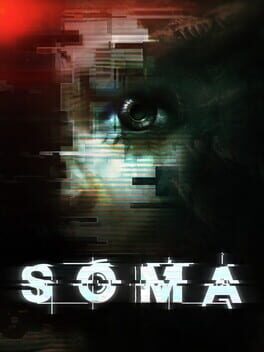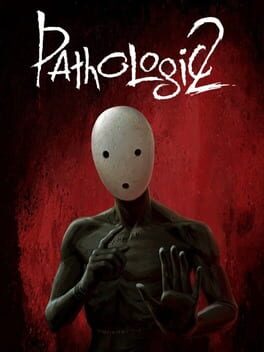jebhappy
2015
EUREKA!
A simulation is structured around creating a fissure which separates the simulated from the applicant experiencing it. The ghost in the machine is a figment desperately seeking its own form of identity separate from the simulation governing its existence. SOMA‘s greatest achievement is the way in which the developers at Frictional Games utilize their chosen medium to effectively simulate a very human story, within the contexts of a virtual constructed universe.
Simon Jarret gradually peels away at his replicated flesh throughout, transforming both physically and mentally as he slowly comes to grips with his counterfeit existence. His voice and backstory present a distinct divorce between protagonist and player, establishing SOMA as a mortal simulation that questions the validity of Simon’s own humanity.
Players begin in a recognizable apartment, then follow along with the protagonist as he volunteers for a radical scientific project, eventually awakening in a dark, deteriorating undersea laboratory where the dead roam the halls as hulking robotic replicants. The proceeding venture eagerly and dreadfully philosophizes on mankind’s limitations, and obsession with technological development, sending its audience to the very depths of the sea to wrangle with the ghosts of a ruptured Earth’s past.
Equal parts horrific and relievingly lighthearted, the ambitious storytelling presents a profound response to the modern generational anxiety surrounding social media manipulation. SOMA revels in its bleak perspective on the simulation as a deceptive and defective mode of personification, right down to its unforgettable toincoss finale, which brilliantly doubts the impact of every step you’ve taken to reach it.
A simulation is structured around creating a fissure which separates the simulated from the applicant experiencing it. The ghost in the machine is a figment desperately seeking its own form of identity separate from the simulation governing its existence. SOMA‘s greatest achievement is the way in which the developers at Frictional Games utilize their chosen medium to effectively simulate a very human story, within the contexts of a virtual constructed universe.
Simon Jarret gradually peels away at his replicated flesh throughout, transforming both physically and mentally as he slowly comes to grips with his counterfeit existence. His voice and backstory present a distinct divorce between protagonist and player, establishing SOMA as a mortal simulation that questions the validity of Simon’s own humanity.
Players begin in a recognizable apartment, then follow along with the protagonist as he volunteers for a radical scientific project, eventually awakening in a dark, deteriorating undersea laboratory where the dead roam the halls as hulking robotic replicants. The proceeding venture eagerly and dreadfully philosophizes on mankind’s limitations, and obsession with technological development, sending its audience to the very depths of the sea to wrangle with the ghosts of a ruptured Earth’s past.
Equal parts horrific and relievingly lighthearted, the ambitious storytelling presents a profound response to the modern generational anxiety surrounding social media manipulation. SOMA revels in its bleak perspective on the simulation as a deceptive and defective mode of personification, right down to its unforgettable toincoss finale, which brilliantly doubts the impact of every step you’ve taken to reach it.
EUREKA!
It is of astonishing import that Sluggish Morss refuses to satisfy its audience with any form of linearity. Even as the player finds their barely tangible entity passing through corridors towards what is an assumed form of progression, time remains delicate, as promised. Puzzles solve themselves for you, robotic voices dissipate any minute essence of humanity, Beyonce is given a mechanical tribute -- in the game’s most brazenly comical moment, no doubt.
Yet through it all, Jack King-Spooner’s remarkable release steps beyond the boundaries of what constitutes a traditional “game.” Is it even a game? The title more serves as an examination of human control, or rather its lack of definition. Whereas Playdead’s INSIDE forces players down a strict path, poetically contradicting its three-dimensional design, Sluggish Morss paints a wrecked, immaterial canvas of vibrant polygons and distorted images.
The future is now is the past is forever; time is ripping apart at the seams; delicate, indeed. A galaxy’s history itself is vividly assembled into wicked collages, prompting many questions from its numerous, nameless individuals who ethereally wander the halls of this cavernous ship (a visually stunning evocation of ‘ghosts in the machine’). But one remains steadfast in its earnest unattainability: Where do we go from here?
In a cyclical sort of irony, the id has raced backwards into the future to contaminate and dissolve centuries of progress; it has all been written in the numbers. A mathematical philosophy governs the game’s prime scenario, in which everything boils down to a predictable science. Emotion is erased, of course, without room for moral inquiry, as in the case of NieR: Automata.
And perhaps this is what makes Sluggish Morss the most provocative philosophical release of the 2010s. It is the very lack of a determined philosophy which prompts such a fascinating and haunting portrayal of human development. The game illustrates a damned future for mankind through the notion that we are gradually erasing the very fabrics of our being one century at a time, and the end lies in an eternity which looks like data exploding off a screen.
It is of astonishing import that Sluggish Morss refuses to satisfy its audience with any form of linearity. Even as the player finds their barely tangible entity passing through corridors towards what is an assumed form of progression, time remains delicate, as promised. Puzzles solve themselves for you, robotic voices dissipate any minute essence of humanity, Beyonce is given a mechanical tribute -- in the game’s most brazenly comical moment, no doubt.
Yet through it all, Jack King-Spooner’s remarkable release steps beyond the boundaries of what constitutes a traditional “game.” Is it even a game? The title more serves as an examination of human control, or rather its lack of definition. Whereas Playdead’s INSIDE forces players down a strict path, poetically contradicting its three-dimensional design, Sluggish Morss paints a wrecked, immaterial canvas of vibrant polygons and distorted images.
The future is now is the past is forever; time is ripping apart at the seams; delicate, indeed. A galaxy’s history itself is vividly assembled into wicked collages, prompting many questions from its numerous, nameless individuals who ethereally wander the halls of this cavernous ship (a visually stunning evocation of ‘ghosts in the machine’). But one remains steadfast in its earnest unattainability: Where do we go from here?
In a cyclical sort of irony, the id has raced backwards into the future to contaminate and dissolve centuries of progress; it has all been written in the numbers. A mathematical philosophy governs the game’s prime scenario, in which everything boils down to a predictable science. Emotion is erased, of course, without room for moral inquiry, as in the case of NieR: Automata.
And perhaps this is what makes Sluggish Morss the most provocative philosophical release of the 2010s. It is the very lack of a determined philosophy which prompts such a fascinating and haunting portrayal of human development. The game illustrates a damned future for mankind through the notion that we are gradually erasing the very fabrics of our being one century at a time, and the end lies in an eternity which looks like data exploding off a screen.
2019
"Reality and fiction walk an incredibly thin line throughout Pathologic 2. There is a constant sense of self-awareness which cuts through the provocative writing. Some may call it “meta,” but the game doesn’t temper its audience with discussions regarding our relationship with artificiality, which modern day indie titles so often seem hung up on. Pathologic 2 is obsessed with fiction, with perusing our collective confusion within an ever-increasingly unstable period of worldwide disorder."
You can read my review over at Project Icarus Gaming:
https://pig.gg/an-ode-to-pathologic-2-the-best-game-of-2019/
You can read my review over at Project Icarus Gaming:
https://pig.gg/an-ode-to-pathologic-2-the-best-game-of-2019/
2016
EUREKA!
The tapes are falling apart. Kitty Horrorshow’s gorgeous masterwork is an exceedingly-realised exercise in metaphorical horror. The interiors of a suburban home become a nightmarish realm akin to a human body, complete with a brain, arms, legs, intestines, even a voice. Horrorshow dutifully considers the sentience of a household, redefining the term ‘haunted house’ as seemingly-effortlessly as she deconstructs typical PC gaming conventions.
VHS horror is the prime motivation behind Anatomy’s dire pacing, the deterioration of a recorded tape reflecting an aging human body’s own gradual decay, and each time the game is rebooted one can feel the cracks in the walls ripping ever so further and further apart. The game’s finest moment recalls a collective fear of the unknown, the notion that our most comfortable surroundings have the ability to suddenly turn on us. The dark basement is the abyss down into which one does not stare, but that which stares into them.
The tapes are falling apart. Kitty Horrorshow’s gorgeous masterwork is an exceedingly-realised exercise in metaphorical horror. The interiors of a suburban home become a nightmarish realm akin to a human body, complete with a brain, arms, legs, intestines, even a voice. Horrorshow dutifully considers the sentience of a household, redefining the term ‘haunted house’ as seemingly-effortlessly as she deconstructs typical PC gaming conventions.
VHS horror is the prime motivation behind Anatomy’s dire pacing, the deterioration of a recorded tape reflecting an aging human body’s own gradual decay, and each time the game is rebooted one can feel the cracks in the walls ripping ever so further and further apart. The game’s finest moment recalls a collective fear of the unknown, the notion that our most comfortable surroundings have the ability to suddenly turn on us. The dark basement is the abyss down into which one does not stare, but that which stares into them.
2014
EUREKA!
There is not a single more groundbreaking nor impactful game release from the 2010s than P.T. The deceptively simplistic title is a radical deconstruction of narrative storytelling conventions and gameplay mechanics, perhaps even moreso than the original Silent Hill games. By only allowing the player to walk and zoom in through a first-person perspective, Hideo Kojima and his mysterious team are demanding them to look closer, to observe, to see what you’ve done, you monster.
Repressed memory causes a psychological influx, the mind turning against itself, and the ghosts of this machine are the grieving recollections of past sin. A rotting woman, a demented fetus in the bathroom sink, liquor bottles scattered all over the floor, eyes, eyes, so many eyes staring. Every layer of P.T. is drowning in metaphysical context, pushing the limits of what a storyteller can accomplish with environmental implications alone.
The game presents a horror story for the internet age, where solving puzzles prompts insight through communal investigation, with startlingly innovative results. By stressing the damage wrought by the nameless, faceless protagonist, whom which Kojima places the player directly within the shoes of, the game becomes a psychological assessment examining the remorseful individual’s longing for recompense and redemption.
But P.T. denies forgiveness; and with each venture through its now-iconic, dreaded hallway, this purgatorial nightmare draws closer and closer to a reality that implicates mindful immorality. The future of gaming has never seemed so bright nor alarming.
There is not a single more groundbreaking nor impactful game release from the 2010s than P.T. The deceptively simplistic title is a radical deconstruction of narrative storytelling conventions and gameplay mechanics, perhaps even moreso than the original Silent Hill games. By only allowing the player to walk and zoom in through a first-person perspective, Hideo Kojima and his mysterious team are demanding them to look closer, to observe, to see what you’ve done, you monster.
Repressed memory causes a psychological influx, the mind turning against itself, and the ghosts of this machine are the grieving recollections of past sin. A rotting woman, a demented fetus in the bathroom sink, liquor bottles scattered all over the floor, eyes, eyes, so many eyes staring. Every layer of P.T. is drowning in metaphysical context, pushing the limits of what a storyteller can accomplish with environmental implications alone.
The game presents a horror story for the internet age, where solving puzzles prompts insight through communal investigation, with startlingly innovative results. By stressing the damage wrought by the nameless, faceless protagonist, whom which Kojima places the player directly within the shoes of, the game becomes a psychological assessment examining the remorseful individual’s longing for recompense and redemption.
But P.T. denies forgiveness; and with each venture through its now-iconic, dreaded hallway, this purgatorial nightmare draws closer and closer to a reality that implicates mindful immorality. The future of gaming has never seemed so bright nor alarming.




